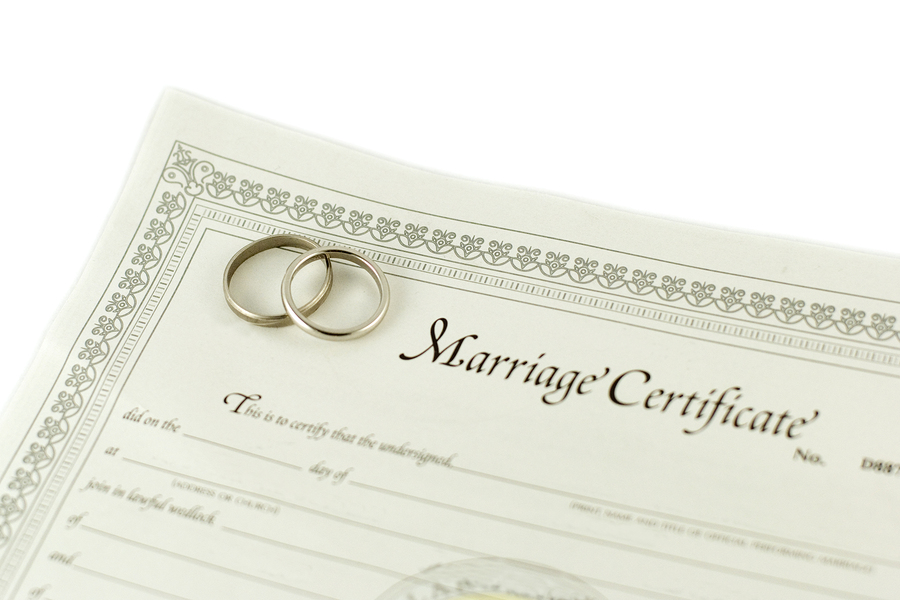
Legal Validity of Foreign Marriages and Divorces for Spouse Green Card Cases
In order to petition for a non-citizen spouse’s permanent residence (based upon marriage), the petitioning spouse must establish the legal validity of the current marriage. In other words, if the marriage is not legal, there is no legal relationship between the parties upon which a visa may be granted. Note that this is a separate and different requirement than proving that the relationship is genuine and not entered into strictly for immigration benefits. For example, a couple may be truly in love with each other, but the marriage may be held invalid by USCIS if there were some defect either in the marriage process or a previous spouse’s divorce proceedings that renders the current marriage technically null and void. A marriage certificate in and of itself is not necessarily proof that the marriage is legal because the license may have been procured under false facts or some sort of misrepresentation.
What about foreign marriages? Does the couple have to remarry in the US?
In general, the legal validity of a marriage is determined by the law of the place where the marriage was celebrated (“place-of-celebration rule”). Under this rule, a marriage is valid for immigration purposes if the marriage is binding under the law of the jurisdiction in which it is performed. In most cases, therefore, if a couple is legally married in another country, they will normally not need to remarry in the United States to start the immigration process. The marriage certificate will, of course, be a necessary piece of evidence to establish that the couple was legally married in that jurisdiction.
Does USCIS accept foreign divorces?
A divorce is the legal termination of a marriage. Provided that the divorce decree was validly obtained from the foreign country, it will generally be recognized in the United States under the principle of comity (“the informal and voluntary recognition by courts of one jurisdiction of the laws and judicial decisions of another”). However, whether the termination of a marriage is deemed legal, and as a result, effective, depends on the law of the state or country where the divorce took place. USCIS will determine the validity of a divorce for immigration purposes by examining whether the state or country where the divorce was issued had proper jurisdiction. USCIS will also examine whether the parties followed and complied with the proper legal formalities required by the state or country to procure the divorce. For example, some jurisdictions may require both parties to be physically present in the jurisdiction. If the divorce was obtained via proxy, there may be a technical, legal defect that could undermine the following marriage for immigration purposes, even if the couple has a marriage certificate to show for it. Other common issues are customary consent divorces issued at home without formal approval or recognition by the government. Such divorces should be brought to the attention of an immigration attorney to ascertain whether USCIS or a consular office may raise objections to the validity of the divorce. In some instances, it may be useful to compile information about foreign divorces and marriages well ahead of time in order to avoid any lengthy delays generated by Requests for Evidence asking for proof that either the divorce or marriage is legally valid.
Note that the information discussed here is only general in nature and should not be construed as legal advice. Because marriage and divorce issues are so sensitive, any individual who has been married previously, either in the US or elsewhere, should disclose and discuss the ramifications of all previous relationships with an immigration attorney. Applicants also need to be cognizant that the legal validity of a marriage is only one of many things that the government considers when reviewing spouse petitions. The last thing one would want to do is to file for a spouse and discover at the end of the process that a visa or status cannot be granted because of legal matrimonial issues.
To keep informed about the latest developments in immigration law, please subscribe to our blog. It is important to understand that the above is only general information and not legal advice. It does not create an attorney-client relationship nor should it be relied upon as legal advice. The law is extremely fact and circumstance sensitive. For an individual legal analysis of your specific legal case, please contact our family immigration lawyers to get in touch with one of our attorneys.
